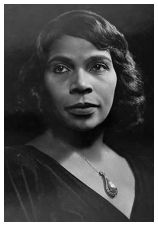

Marian Anderson
Born: February 27, 1897
Place: Philadelphia, Pennsylvania
Died: April 8, 1993
Place: Portland, Oregon
 Marian Anderson was born on February 27, 1897 in Philadelphia, Pennsylvania. She went to local schools and at the age of six she joined the junior choir of Philadelphia's Union Baptist Church. Marian's beautiful voice, her love of singing, and her steadfast faith guided her throughout her life. She attended South Philadelphia High School for Girls, sang with the Philadelphia Choral Society, and graduated from high school in 1921. With the help of her family and community, Marian knew that she would pursue a career with her remarkable voice. She was encouraged to take voice lessons, and with the support of Philadelphia's Union Baptist church, she began to study under the internationally recognized Giuseppe Boghetti during her final year of high school. He guided her in the technical aspects of voice training, and he helped her expand her repertoire. In 1925, he encouraged her to enter a singing contest, competing against 300 singers. She won, and the first prize was the opportunity to sing with the New York Philharmonic Orchestra, which she did on August 26, 1925.
Marian Anderson was born on February 27, 1897 in Philadelphia, Pennsylvania. She went to local schools and at the age of six she joined the junior choir of Philadelphia's Union Baptist Church. Marian's beautiful voice, her love of singing, and her steadfast faith guided her throughout her life. She attended South Philadelphia High School for Girls, sang with the Philadelphia Choral Society, and graduated from high school in 1921. With the help of her family and community, Marian knew that she would pursue a career with her remarkable voice. She was encouraged to take voice lessons, and with the support of Philadelphia's Union Baptist church, she began to study under the internationally recognized Giuseppe Boghetti during her final year of high school. He guided her in the technical aspects of voice training, and he helped her expand her repertoire. In 1925, he encouraged her to enter a singing contest, competing against 300 singers. She won, and the first prize was the opportunity to sing with the New York Philharmonic Orchestra, which she did on August 26, 1925.
Marian Anderson's voice is classified as a contralto. She could comfortably sing a range from low baritone to high soprano. Her talent was undeniable. Yet racial biases hindered her acceptance in the United States during the late 1920's and into the 1930's. She found wider acceptance in Europe during these years, and she toured extensively, studying, performing, and gaining the respect of her European audiences. Her repertoire continued to expand, ranging from sprituals to classical pieces.
In 1935, Marian Anderson returned to the United States, this time with the fame that had spread across the oceans. She was a box office hit, but she still encountered the racial barriers of the times. Then in 1939, she was scheduled to give a concert at Constitution Hall in Washington, D.C., but her performance was stopped by the Daughters of the American Revolution (DAR) when the DAR learned that a colored person was scheduled to perform. This action prompted First Lady Eleanor Roosevelt to resign from the DAR. Mrs. Roosevelt did not stop there. She organized a concert to be given by Marian Anderson at the Lincoln Memorial. The concert was attended by 75,000 people, and heard by millions more over the radio. In her own dignified way, Marian Anderson became a symbol of breaking color barriers in the U.S. The entire episode resulted in America beginning to focus in on its problems of racial discrimination. Marian Anderson continued her vocal career for the rest of her life. In 1955 she became the first black person to join the New York Metropolitan Opera. She sang at the presidential inaugurations of Dwight D. Eisenhower and John F. Kennedy. She received the Presidential Medal of Freedom in 1963, a Congressional gold medal in 1978, the Eleanor Roosevelt Human Rights Award in 1984, and in 1991 she received a Grammy Lifetime Achievement Award. She died in Portland, Oregon on April 8. 1993.
Marian Anderson is often portrayed as more of a civil rights legend than a singer. But her focus really was on sharing her gift of voice with the world. Brandeis Professor Allan Keiler's biography of Marian Anderson presents her life as Marian lived it, as a vocalist determined to share her voice with all people. Purchase Allan Keiler's
Marian Anderson: A Singer's Journey for a very good portrayal of this talented woman's illustrious career. Click
here to buy this book now from Amazon.com.
Want to experience Marian Anderson's captivating voice for yourself? Click
here to purchase the CD
Prima Voce - Marian Anderson /Shaw from Amazon.com. It is a stunning collection of spirituals and classical baroque pieces that feature the rich contralto of the great Marian Anderson.
|




